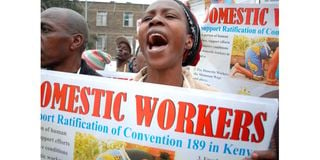Forming domestic worker cooperatives long overdue

Kenyan domestic workers during a past demonstration in Nairobi, over their rights
June 16 is the International Domestic Workers Day, when we honour. The ILO Convention 189 defines domestic work as “work performed in or for a household or households”.
It includes a range of tasks—like house cleaning, cooking, laundering, taking care of children or elderly or sick family members, gardening, guarding the house, driving for the family and taking care of household pets.
Domestic workers make a significant portion of the global workforce, often in informal employment or under unclear terms. With 80 per cent women, domestic work may be considered gendered.
Article 41 of the Constitution and the Employment Act 2007 guarantee workers favourable labour practices to safeguard their human dignity. These assurances should accord Kenya’s two million such workers a decent work environment. However, not every domestic worker enjoys the protection.
A 2013 Oxfam report on domestic workers in Nairobi’s informal settlements reveals that, due to lack of regular employment, domestic workers chance by sitting at strategic locations in middle-income areas with a hope of getting menial jobs. It exposes them to hours in the sun, rain or chilly conditions.
For female workers, this precarity became more pronounced at the height of Covid-19 pandemic. They are paid poorly and also exposed to abusive treatment like physical, sexual and mental exploitation and performing varying workload beyond initial agreements without compensation.
A common coping mechanism involves group solidarity where, for instance, the women look out for one another and exchange references for alternative employers. However, domestic worker cooperatives, which are long overdue, would provide an alternative for the domestic workers. They would enhance the functions of solidarity and, perhaps, through a digital platform, link them to employers.
A domestic workers’ cooperative can be used to undertake various activities to benefit members. First, it would provide a channel through which members can handle work-related concerns. It will provide support to those exploited by engaging the authorities or organising a boycott of known violators.
Secondly, it can enhance member skills and improve service delivery through training of members. It is easier for a cooperative to secure resource persons at a common venue and at reasonable rates than for individuals. Training and better service delivery will open access to a broader pool of jobs.
Thirdly, financial literacy is usually a challenge among low-income earners, often a result of, among others, low education levels. Through a cooperative, workers will receive training to raise awareness and knowledge on financial management.
Fourth, the cooperative can organise access to social security services, including retirement benefits and health insurance for members. Additional offers may include last expense group insurance.
Lastly, it could establish a sacco to help members to make savings and take out development loans.
Prof Nyamongo, an anthropologist, is a deputy vice-chancellor at The Cooperative University of Kenya. [email protected]. @Prof_IKNyamongo





